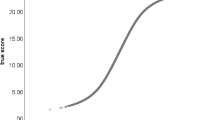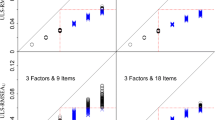Abstract
Based on the constructionist point of view applied to Subjective Well-Being (SWB), five hypotheses were advanced about the predictive power of the top-down effects and bottom-up processes over a five years period. The sample consisted of 297 respondents, which represent the Italian sample of a European longitudinal survey; the first phase was conducted in 1995 and the follow-up in 2000. Satisfaction judgments were collected on Overall Life Satisfaction (OLS) and on seven Life Facet Satisfaction (LFS) domains. The top-down effects were measured using a method derived from the constructionist point of view. Life conditions, which represent the bottom-up processes, were gathered by structured questionnaire and were optimized by a factor analyses. A stepwise regression was performed in each satisfaction judgment to test the five hypotheses, which were confirmedwith only few exceptions. The results revealed that the top-down effects were a significant predictor in all satisfaction judgments, especially in OLS, where it was the strongest predictor. Life conditions (bottom-up factors) were less strong predictors than the top-down effects, but they became strong predictors if they were gathered at the same time as satisfaction judgments.
Similar content being viewed by others
References
P.H. Blaney (1986) ArticleTitle’Affect and memory: A review’ Psychological Bulletin 99 229–246 Occurrence Handle10.1037//0033-2909.99.2.229 Occurrence Handle1:STN:280:BimC2sfhsVw%3D Occurrence Handle3515383
E. Diener (1984) ArticleTitle’Subjective well-being’ Psychological Bulletin. 95 542–575 Occurrence Handle10.1037//0033-2909.95.3.542 Occurrence Handle1:STN:280:BimD3MjjvVM%3D Occurrence Handle6399758
E. Diener (1994) ArticleTitle’Assessing subjective well-being: Progress and opportunities’ Social Indicators Research. 31 103–157 Occurrence Handle10.1007/BF01207052
E. Diener C.K. Napa Scollon S. Oishi V. Dzokoto E.M. Suh (2000) ArticleTitle’Positivity and the construction of life satisfaction judgments: Global happiness is not the sum of its parts’ Journal of Happiness Studies 1 159–176 Occurrence Handle10.1023/A:1010031813405
J.J. Ehrhardt W.E. Saris R. Veenhoven (2000) ArticleTitle’Stability of life-satisfaction over time’ Journal of Happiness Studies. 1 177–205 Occurrence Handle10.1023/A:1010084410679
R. Emmons E. Diener (1985) ArticleTitle’Factor predicting satisfaction judgment: A comparative examination’ Social Indicators Research. 16 157–168 Occurrence Handle10.1007/BF00574615
C.R. Fox D. Kahneman (1992) ArticleTitle’Correlation, causes and heuristics in survey of life satisfaction’ Social Indicator Research. 27 221–234
V.F. Guidano (1987) The Complexity of Self Guilford New York
F.A. Hayek (1978) New Studies in Philosophy, Politics, Economics and the History of Ideas University of Chicago Press Chicago
H.J. Hippler N. Schwarz S. Sudman (Eds) (1987) Social Information Processing and SurveyMethodology Springer-Verlag New York
D. Kahneman P. Slovic A. Tversky (1982) Judgment under Uncertainty: Heuristics and Biases Cambridge University Press New York
G.A. Kelly (1955) The Psychology of Persona Constructs Norton New York
Leonardi, F., L. Spazzafumo, F. Marcellini and C. Gagliardi: 1999, ’The topdown/ bottom-up controversy from a constructionist approach. A method for measuring top-down effects applied to a sample of older people’, Social Indicators Research 48, pp. 187-216
K.H. Pribram (1982) ’Reflections on the place of brain in the ecology of mind’ W.B. Weimer D.S Palermo (Eds) Cognition and the Symbolic Processes, Vol. 2 Erlbaum Hillsdale, NJ
M. Ross A. Eyman N. Kishchuck (1986) ’Counterfactual thinking: A critical overview’ N.J. Roese J.M. Olson (Eds) What Might Have Been: The Social Psychology of Counterfactual Thinking Erlbaum Hillsdale, NJ
A.F. Sameroff (1982) ’Development and the dialectic: The need for a system approach’ W.A. Collins (Eds) The Concept of Development Erlbaum Hillsdale, NJ
A. Sherpenzeel (1995) A Question of Quality: Evaluating Survey Question by Multi-trait - Multimethod Studies Nimmo Amsterdam
H. Schuman S. Presser (1981) Questions and Answers in Attitude Surveys: Experiments on Question form. Wording and Context Academic Press New York
N. Schwarz G. Clore (1983) ArticleTitle’Mood, misattribution, and judgments of well-being Informative and directive functions of affective states’ Journal of Personality and Social Psychology. 45 513–523 Occurrence Handle10.1037//0022-3514.45.4.884
N. Schwarz F. Strack (1991) ’Evaluating one’s life: A judgment model of subjective well-being’ F. Strack M. Argyle N. Schwarz (Eds) SubjectiveWell-being Pergamon Oxford 27–48
N. Schwarz F. Strack (1999) ’Reports of subjective well-being: Judgmental processes and their methodological implications’ D. Kahneman E. Diener N. Schwarz (Eds) Well-being: The Foundations of Hedonic Psychology Russell Sage Foundations New York 61–84
G. Stolzenberg (1984) ’Can an inquiry into the foundations of mathematics tell us anything interesting about mind?’ P. Watzlawick (Eds) The Invented Reality Norton New York
F. Strack N. Schwarz E. Gschneidinger (1985) ArticleTitle’Happiness and reminiscing: The role of time perspective, affect and mode of thinking’ Journal of Personality and Social Psychology. 49 1460–1469 Occurrence Handle10.1037//0022-3514.49.6.1460
F. Strack L.L. Martin N. Schwarz (1988) ArticleTitle’Priming and communication: Social determinants of information use in judgments of life satisfaction’ European Journal of Social Psychology. 18 429–442
R. Tourangeau (1984) ’Cognitive science and survey methods’ T.B. Jabine M.L. Straf J.M. Tanur R. Tourangeau (Eds) Cognitive Aspects of Survey Methodology:Building a Bridge betweenDisciplines NationalAcademy press Washington, DC
F. Varela (1979) Principles of Biological Autonomy North Holland New York
R. Veenhoven (1984) Conditions of Happiness Kluwer Academy Dordrecht
E. Glasersfeld ParticleVon (1984) ’Introduction to radical construcvism’ P Watzlawick (Eds) The Invented Reality Norton New York
P. Watzlawick (Eds) (1984) The Invented Reality Norton New York
W.B. Weimer (1977) ’A conceptual framework for cognitive psychology: Motor theories of the mind’ R. Shaw J.D. Bransford (Eds) Perceiving, Acting, and Knowing Erlbaum Hillsdale, NJ
R.S. Wyer T.K. Srull (1989) Memory and Cognition in its Social Context Erlbaum Hillsdale, NJ
Author information
Authors and Affiliations
Corresponding author
Rights and permissions
About this article
Cite this article
Leonardi, F., Spazzafumo, L. & Marcellini, F. Subjective Well-Being: The Constructionist Point of View. A Longitudinal Study to Verify The Predictive Power of Top-Down Effects and Bottom-Up Processes. Soc Indic Res 70, 53–77 (2005). https://doi.org/10.1007/s11205-005-5016-7
Accepted:
Issue Date:
DOI: https://doi.org/10.1007/s11205-005-5016-7




